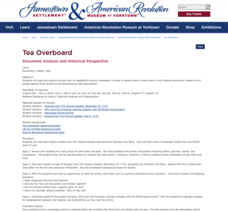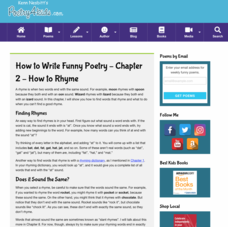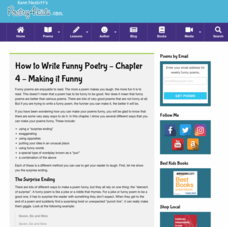Jamestown-Yorktown Foundation
Tea Overboard
While less well known than the event in Boston, the Yorktown Tea Party was equally decisive in turning community sentiment against Great Britain. To gain an understanding of why the colonists objected to the Tea Act, young historians...
Jamestown-Yorktown Foundation
Life of a Private Lesson Plan
In order to understand the challenges the Continental Army faced during the American Revolution, class members analyze primary source materials including a soldier's journal and an officer's letter, and watch a short reenactment video.
Jamestown-Yorktown Foundation
Making a Patriot Inquiry: Are Independence, Freedom, and Liberty the Same Thing?
As part of a study of the American Revolution, class members engage in an inquiry-based lesson that has them watch a scene from the play Slave Spy, examine multiple primary source documents, and then discuss the similarities and...
Poetry4kids
How to Write a Diamante Poem
A lesson begins with a description of a diamante poem and the rules to follow while writing one. Scholars examine the ins and outs of synonym and antonym diamantes, then compose an original poem using their newfound knowledge.
Poetry4kids
How to Write a Cinquain Poem
A lesson challenges scholars to create a cinquain poem. Writers begin by choosing a topic and brainstorm details, then compose their original poem making sure to count syllables.
Jamestown-Yorktown Foundation
How Did Relations between Britain and the Colonies Change after the French and Indian War?
What does the French and Indian War have to do with the American Revolution? Following the war, Britain issued the Proclamation of 1763 in an attempt to limit the colonists' western expansion. To understand how the proclamation, the...
Jamestown-Yorktown Foundation
Why Did Some Colonial Virginians Continue to Support the King?
Not all colonials supported the American Revolution. A resource from the American Revolution Museum at Yorktown ask young historians to investigate the reasons why some colonial Virginians were loyalist and continued to support King...
Poetry4kids
How to Host an Open Mic Poetry Party
Four steps to Open Mic Night! The location, invitations, supplies, and party favors are all part of the process in planning and hosting a fun-filled gathering where scholars read aloud an original poem or one by their favorite author.
Poetry4kids
How to Write a Repetition Poem
A repetition poem is the focus of a lesson that challenges scholars to compose an original piece. To add meaning to their poem, authors choose words to repeat at the start of most lines.
Poetry4kids
How to Write a “Favorite Things” List Poem
If your students made a list of their favorite things, would writing poetry be on it? After this poetry writing lesson, it might! Young writers make a list of what they like—or what they don't like—before crafting the list into a rhyming...
Poetry4kids
How to Write an Exaggeration Poem
The best poetry writing lesson of all time is here for you! Learn all about the art of exaggeration with a lesson on exaggeration poems, which instructs students to use wild imagery to convey their message.
Poetry4kids
How to Write a “Backward” Poem
If you like poetry, wait till you try backward poetry! Young writers read Shel Silverstein's "Backward Bill" before writing their own funny poems that are full of backward imagery and phrasing.
Poetry4kids
How to Write a Tanka Poem
Take your haikus to the next level with tanka poems, another form of Japanese poetry that regulates the length and rhythm of each line by syllables. Young writers read the explanation, examples, and tips for tanka poems before writing...
Poetry4kids
How to Write a Clerihew
Writing funny poems is the best part about learning poetic forms! Young poets learn all about clerihews—humorous four-line poems about people—with an explanatory lesson.
Poetry4kids
How to Write a Fractured Nursery Rhyme
Scholars take a popular song or nursery rhyme and make it their own as they write a fractured nursery rhyme. Writers seek out a nursery rhyme's rhyming words and change them to create an original poem.
Arbor Day Foundation
Trees: A Joy Forever
This Arbor Day, put on a show! A three-scene play follows a boy and girl that run into Arbor Day founder, J. Sterling Morton. Morton describes how the holiday came to be and discovers how his hard work has grown into a national...
Poetry4kids
How to Write a Tongue Twister
Betty Botter and Theophilus Thistle provide models for willy writers to wrestle words into tricky tongue twisters.
Poetry4kids
Evoking the Senses in a Poem
Budding poets choose a topic for a sensory-filled poem. Authors describe that topic using detailed language based on the five senses. Then, switch the senses to create a fanciful poem intended to add a touch of fun to the objective.
Poetry4kids
Rhyme Schemes Lesson Plan
Scholars read four brief poems and analyze their word usage in order to identify the rhyme scheme.
Poetry4kids
How to Write an Apology Poem
Put a silly spin on making amends with an apology poem. Budding poets think of a time they were made to apologize although they didn't mean it. They then turn their experience into a poem that offers details and ends with an explanation...
Poetry4kids
How to Create Book Spine Poetry
Can you create a poem without writing a word! With found poetry, you can! Practice one version of found poetry with a lesson on book spine poems. Learners create poems by stacking books and reading the lines created by their spine titles.
Poetry4kids
How to Write Funny Poetry — Chapter 2: How to Rhyme
Funny poems don't have to rhyme—but it helps! Learn how to use rhyming words to add humor to funny, clever, or just plain silly poems.
Poetry4kids
How to Write Funny Poetry — Chapter 4: Making It Funny
You've got your topic—now how do you make your poem funny? Explore ways to make a poem humorous, including puns, exaggeration, silly words, and surprising endings, with a helpful poetry lesson.
Poetry4kids
How to Write Funny Poetry — Chapter 3: Choosing a Topic
Nothing's better than a really funny poem! Help young writers craft their funny poems with a lesson on one of the most challenging parts of writing: picking what to write about.

























